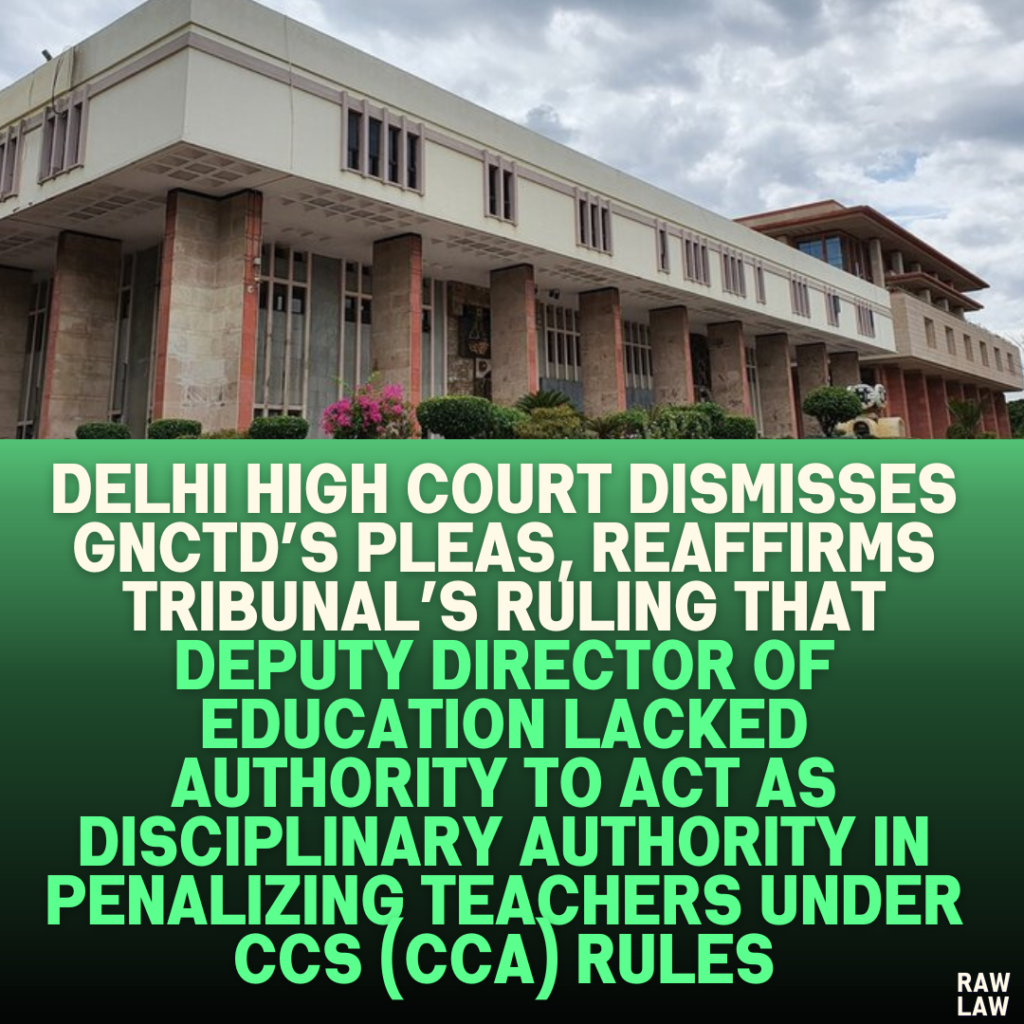Court’s Decision
The Delhi High Court dismissed two writ petitions filed by the Government of NCT of Delhi (GNCTD) challenging a common judgment passed by the Central Administrative Tribunal (CAT). The CAT had ruled that the Deputy Director of Education (DDE) was not authorized to act as the Disciplinary Authority (DA) for imposing penalties on Trained Graduate Teachers (TGTs). The court applied its earlier decision in GNCTD v. Udal Singh (2024 SCC Online Del 7987), where it upheld the CAT’s judgment on the same issue. Consequently, the High Court affirmed the CAT’s findings and dismissed GNCTD’s petitions with no costs imposed.
Facts
- Disciplinary Proceedings: The respondents in the case were employed as Trained Graduate Teachers (TGTs) under the Directorate of Education (DOE). They were issued charge sheets under Rule 14 of the Central Civil Services (Classification, Control, and Appeal) Rules, 1965 (CCS (CCA) Rules), by the Deputy Director of Education (DDE) for alleged misconduct.
- Penalties Imposed:
- After conducting an inquiry, the DDE imposed the penalty of reducing the respondents’ pay by three stages until their retirement.
- The respondents appealed under Rule 23 of the CCS (CCA) Rules. The Secretary (Education), serving as the appellate authority, reduced the penalty to a one-stage pay reduction till retirement.
- Challenge Before CAT:
- The respondents, along with another TGT, Udal Singh, challenged the authority of the DDE to act as the DA in the Central Administrative Tribunal (CAT), New Delhi.
- CAT’s Decision:
- On December 1, 2023, the CAT issued a common judgment in favor of the respondents, ruling that the DDE was not competent to act as the DA under the CCS (CCA) Rules.
- GNCTD filed separate writ petitions before the High Court against the CAT’s ruling for each respondent and Udal Singh.
- Udal Singh Case Outcome:
- In a similar writ petition filed against CAT’s judgment regarding Udal Singh, the Delhi High Court dismissed GNCTD’s petition on November 14, 2024.
Issues
The primary legal issue was whether the Deputy Director of Education (DDE) was competent to act as the Disciplinary Authority under the CCS (CCA) Rules for imposing penalties on TGTs.
Petitioner’s Arguments
- The GNCTD contended that the DDE was authorized under the CCS (CCA) Rules to act as the DA in disciplinary proceedings against TGTs.
- It was argued that the disciplinary actions and penalties imposed were valid and in compliance with the applicable regulations.
Respondent’s Arguments
- The respondents asserted that the DDE did not possess the requisite authority to act as the DA under the CCS (CCA) Rules.
- They argued that any actions taken by an authority without proper designation or competence were invalid, including the penalties imposed.
Analysis of the Law
- Rule 14 of the CCS (CCA) Rules:
- This rule governs the procedure for disciplinary proceedings and specifies the authorities competent to issue charge sheets and impose penalties.
- The rule does not grant the DDE the authority to act as the DA unless expressly designated.
- Legal Principle:
- Disciplinary actions must strictly comply with procedural requirements and must be carried out by authorities duly authorized under the rules.
- CAT’s Interpretation:
- The CAT found that the DDE exceeded its jurisdiction by acting as the DA and imposing penalties. As such, the disciplinary actions were deemed void.
Precedent Analysis
- GNCTD v. Udal Singh:
- The High Court had earlier dismissed a writ petition filed by GNCTD challenging the CAT’s judgment in the Udal Singh case, which arose from the same common CAT ruling.
- The court’s decision in Udal Singh served as a binding precedent, given the identical facts and legal issues.
- Application of Precedent:
- The High Court observed that since the Tribunal’s judgment was common for all respondents, and the writ petition regarding Udal Singh had already been dismissed, the present petitions could not be distinguished.
Court’s Reasoning
- The High Court noted that the situation of the respondents was identical to that of Udal Singh.
- The CAT’s judgment in all cases was common, and the dismissal of the writ petition in Udal Singh established the legal position.
- The court held that consistency required the dismissal of the present petitions, as there were no distinguishing factors or new arguments presented by GNCTD.
Conclusion
The Delhi High Court dismissed the writ petitions filed by GNCTD, upholding the CAT’s judgment that the DDE lacked the authority to act as the Disciplinary Authority. The court also refrained from imposing costs on GNCTD.
Implications
- Compliance with Rules:
- The judgment underscores the importance of strict compliance with procedural rules in disciplinary proceedings against government employees.
- Authority and Jurisdiction:
- It reiterates that actions taken by unauthorized authorities under statutory frameworks are invalid.
- Precedential Value:
- The case sets a precedent for similar disputes concerning the competence of disciplinary authorities under the CCS (CCA) Rules.
